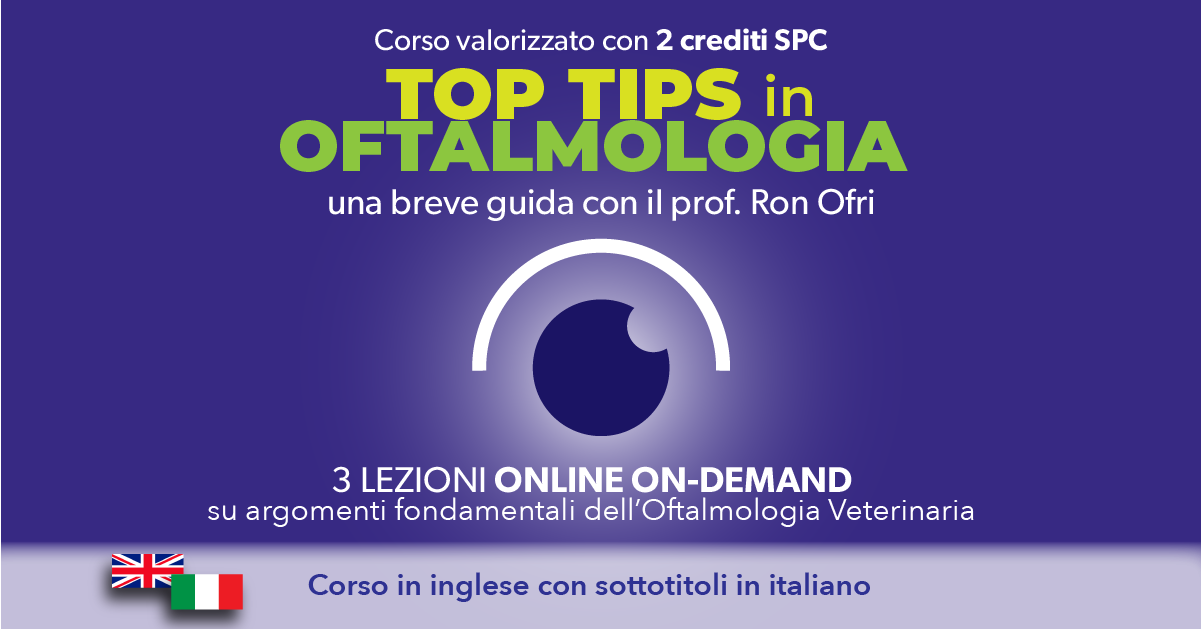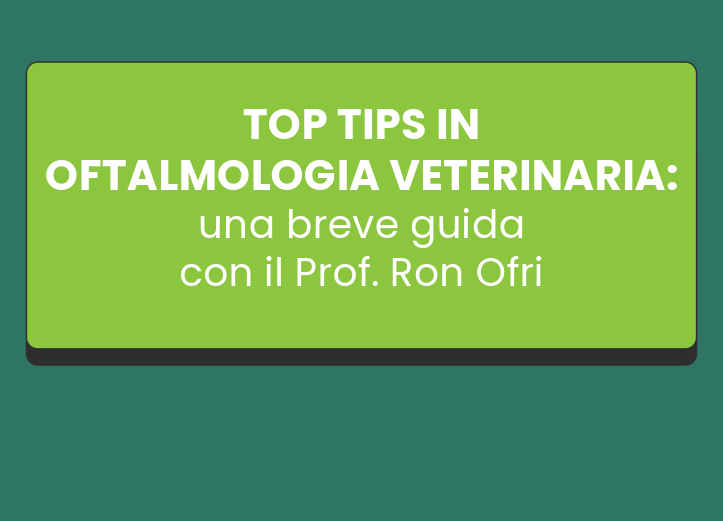- Graduated in Veterinary Medicine
- Student in Veterinary Medicine
To 05/03/2027

Top Tips in Oftalmologia Veterinaria - Ofri - Introduzione
Tutte le lezioni sono sottotitolate in lingua italiana
Il corso online “Top Tips in Veterinary Ophthalmology: a short guide with Prof. Ron Ofri” verte su 3 argomenti fondamentali della Oftalmologia Veterinaria:
Challenges in eyelid surgery
Ci sono numerose indicazioni per la chirurgia delle palpebre, tra cui la correzione di entropion ed ectropion, la resezione di tumori, la riparazione di lacerazioni, ecc. Impara i principi della chirurgia di questo organo delicato.”
Uveitis: It’s a clinical sign, not a diagnosis!
Spesso l’uveite anteriore e/o posteriore è semplicemente una manifestazione di una malattia sistemica. Può essere secondaria anche a cataratta (nei cani), neoplasie (nei pazienti anziani) e malattie corneali. Sebbene alcuni casi possano essere idiopatici, una diagnosi di uveite richiede un’indagine approfondita per scoprire la causa primaria. È necessario un trattamento tempestivo, poiché le complicanze dell’uveite possono portare alla cecità. Tuttavia, un trattamento senza una diagnosi adeguata di solito si traduce solo in un sollievo temporaneo e potrebbe mettere a repentaglio la vita del paziente poiché una condizione sistemica potenzialmente grave non viene diagnosticata.
Glaucoma: Understanding & treating a leading, and painful, cause of blindness
“Occhio rosso” è un disturbo oculare molto frequente. Impariamo a distinguere tra le sue cause Il riconoscimento precoce del glaucoma è cruciale per preservare la vista dei pazienti. Impara come diagnosticare e gestire questa dolorosa malattia che può portare alla cecità.
The “Top Tips in Veterinary Ophthalmology: a short guide with Prof. Ron Ofri” e-learning course will cover 3 foundamental topics of Veterinary Ophthalmology:
Challenges in eyelid surgery
There are numerous indications for eyelid surgery including correction of entropion and ectropion, resection of tumors, repair of lacerations, etc. Learn the principles of surgery in this critical organ.
Uveitis: It’s a clinical sign, not a diagnosis!
Often, anterior and/or posterior uveitis is simply a manifestation of a systemic disease. It may also be secondary to cataract (in dogs), neoplasia (in elderly patients) and corneal disease. Though some cases may be idiopathic, a diagnosis of uveitis mandates a thorough investigation to uncover the primary cause. Prompt treatment is required, as complications resulting from uveitis may lead to blindness. However, treatment without proper diagnosis will usually result only in temporary relief, and may very well endanger the patient’s life as a potentially grave systemic condition is not diagnosed.
Glaucoma: Understanding & treating a leading, and painful, cause of blindness
Early recognition of glaucoma is crucial for saving vision of patients. Learn how to diagnose and manage this painful and blinding disease.
COSTO DEL CORSO: € 150 + IVA
Quota agevolata studenti: € 120 + IVA
È possibile versare la quota d’iscrizione unicamente tramite PayPal, carta di credito o tramite finanziamento con PagoLight PRO.
COURSE FEE: € 150 + VAT
Discounted student fee: € 120 + VAT
The registration fee can only be paid via PayPal or credit card.
Informazioni
- Per completare il corso è necessario visionare tutti i contenuti.
- Solo chi avrà completato il corso potrà ricevere l’attestato finale.
- I contenuti video saranno accessibili per 12 mesi dalla data di acquisto.
Modalità di iscrizione
- Le iscrizioni devono essere effettuate sul sito UNISVET nella pagina dedicata all’evento.
- Le iscrizioni sono riservate ai soci UNISVET (l’iscrizione a UNISVET è gratuita).
L’iscrizione dà diritto a
- Partecipazione al corso.
- Attestato di partecipazione.
- 2 Crediti SPC*.
*Crediti SPC (Only for Italian participants)
- Per ottenere i crediti SPC previsti è necessario visualizzare interamente tutte le lezioni del corso almeno una volta entro 365 giorni dalla data di acquisto.
- La richiesta di assegnazione di tali crediti verrà inoltrata nel portale dedicato dopo la chiusura del corso.
In Conformità con il Regolamento FNOVI riguardante gli SPC (Sviluppo Professionale Continuo) Unisvet, essendo provider ECM e inserita dal Ministero della Salute pubblica nell’Elenco delle Società Scientifiche e associazioni tecnico-scientifiche delle professioni sanitarie, valorizzerà il corso con 1 credito SPC per ogni 60 minuti di lezione.
Information
- To complete the course you must watch all the contents.
- Only those who have completed the course can receive the final certificate.
- Video content will be accessible for 12 months from the subscription date.
How to subscribe
- Subscription must be done on the UNISVET website on the event page.
- Subscription is reserved for UNISVET members (UNISVET membership is free of charge).
Subscription entitles to
- Partecipate to the course.
- Attendance certificate.

